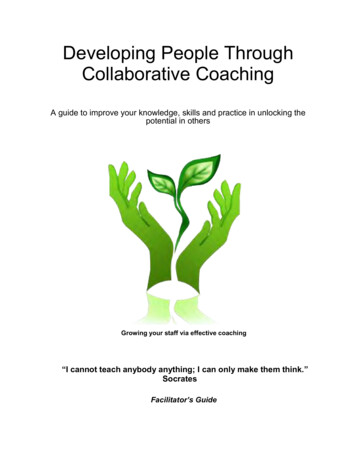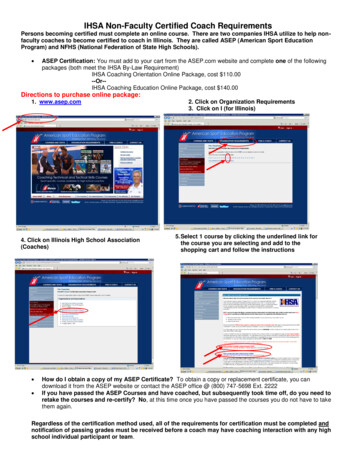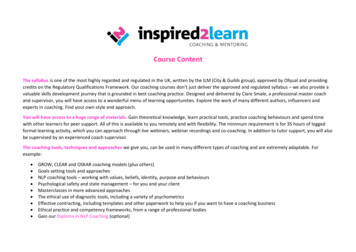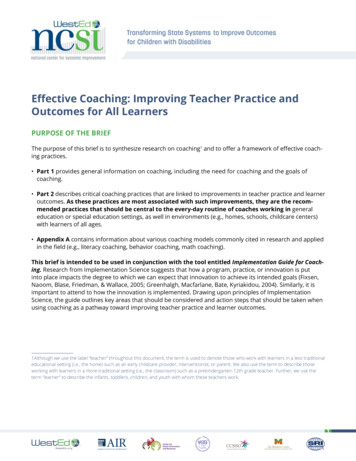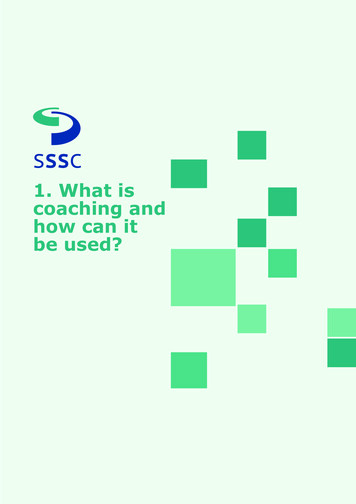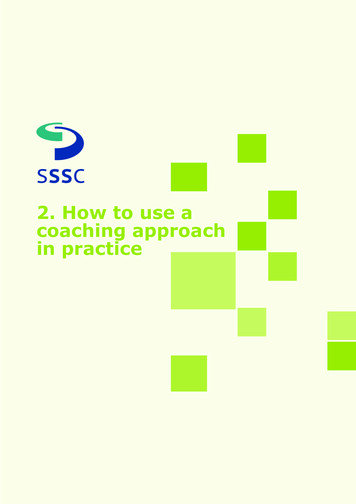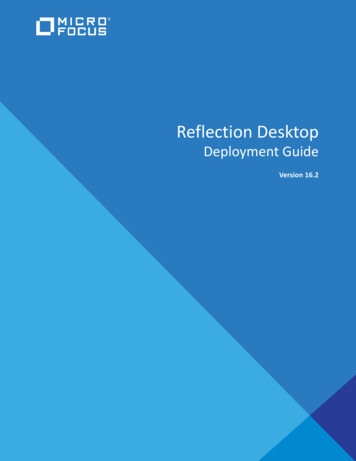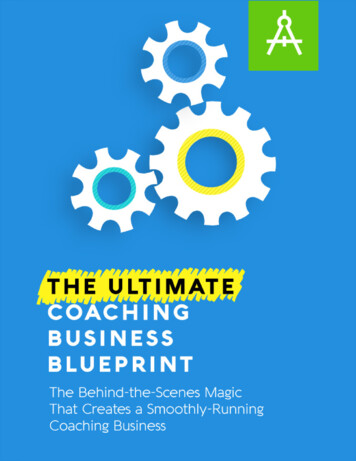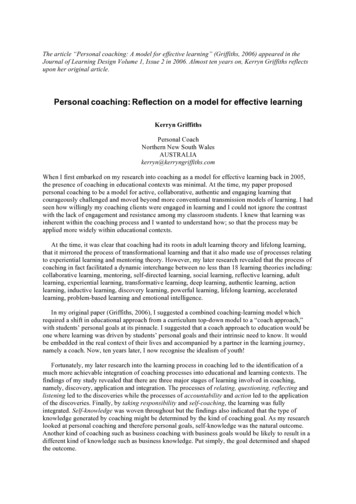
Transcription
The article “Personal coaching: A model for effective learning” (Griffiths, 2006) appeared in theJournal of Learning Design Volume 1, Issue 2 in 2006. Almost ten years on, Kerryn Griffiths reflectsupon her original article.Personal coaching: Reflection on a model for effective learningKerryn GriffithsPersonal CoachNorthern New South WalesAUSTRALIAkerryn@kerryngriffiths.comWhen I first embarked on my research into coaching as a model for effective learning back in 2005,the presence of coaching in educational contexts was minimal. At the time, my paper proposedpersonal coaching to be a model for active, collaborative, authentic and engaging learning thatcourageously challenged and moved beyond more conventional transmission models of learning. I hadseen how willingly my coaching clients were engaged in learning and I could not ignore the contrastwith the lack of engagement and resistance among my classroom students. I knew that learning wasinherent within the coaching process and I wanted to understand how; so that the process may beapplied more widely within educational contexts.At the time, it was clear that coaching had its roots in adult learning theory and lifelong learning,that it mirrored the process of transformational learning and that it also made use of processes relatingto experiential learning and mentoring theory. However, my later research revealed that the process ofcoaching in fact facilitated a dynamic interchange between no less than 18 learning theories including:collaborative learning, mentoring, self-directed learning, social learning, reflective learning, adultlearning, experiential learning, transformative learning, deep learning, authentic learning, actionlearning, inductive learning, discovery learning, powerful learning, lifelong learning, acceleratedlearning, problem-based learning and emotional intelligence.In my original paper (Griffiths, 2006), I suggested a combined coaching-learning model whichrequired a shift in educational approach from a curriculum top-down model to a “coach approach,”with students’ personal goals at its pinnacle. I suggested that a coach approach to education would beone where learning was driven by students’ personal goals and their intrinsic need to know. It wouldbe embedded in the real context of their lives and accompanied by a partner in the learning journey,namely a coach. Now, ten years later, I now recognise the idealism of youth!Fortunately, my later research into the learning process in coaching led to the identification of amuch more achievable integration of coaching processes into educational and learning contexts. Thefindings of my study revealed that there are three major stages of learning involved in coaching,namely, discovery, application and integration. The processes of relating, questioning, reflecting andlistening led to the discoveries while the processes of accountability and action led to the applicationof the discoveries. Finally, by taking responsibility and self-coaching, the learning was fullyintegrated. Self-knowledge was woven throughout but the findings also indicated that the type ofknowledge generated by coaching might be determined by the kind of coaching goal. As my researchlooked at personal coaching and therefore personal goals, self-knowledge was the natural outcome.Another kind of coaching such as business coaching with business goals would be likely to result in adifferent kind of knowledge such as business knowledge. Put simply, the goal determined and shapedthe outcome.
Journal of Learning DesignNow I look back on the combined coaching-learning model I suggested in my original paper andcompare it to the process of learning in coaching I uncovered during my later research (see Griffiths &Campbell, 2009). I also reflect on the later work I did in vocational education where I actively usedthe coaching learning processes to patch educational gaps (and heal emotional wounds) left in adultsafter more than a decade of traditional schooling. In the light of this reflection, I would now propose adifferent combined coaching-learning model (see Figure 1).GOALDiscoverApplyIntegrateGOAL Personally meaningful goal Relating Questioning Reflecting Listening Holding accountable Taking action Iterative discovery process Taking responsiblity Self-coaching Iterative discovery and applicationprocesses Personally meaningful goalFigure 1: Combined Coaching-Learning ModelFigure 1 illustrates how the coaching learning processes of discovery, application and integrationbegin and end with a personally meaningful goal. Therefore, students’ personal goals still determinethe direction of learning, rather than a curriculum. The school teacher in me says this is impossible butthe vocational trainer in me knows how possible it is.The course of learning is directed by the students’ personally meaningful goals. In their pursuit ofthese goals, they discover new knowledge, apply it to their personally meaningful contexts andeventually integrate it so it becomes part of who they know themselves to be and what they arecapable of. Typically, the result of this is the achievement of, or advancement towards, theirpersonally meaningful goals. The discoveries are made through trusted learning relationships anddriven by questioning, usually beginning with the teacher/coach but later, expanded by other learningpartners, such as fellow students and mentors, and also continued by questioning the self (selfcoaching). Reflection and listening result in learning and, importantly, the recognition of the learningitself. This learning is then applied through accountability and action and, as the student takesresponsibility, it is integrated into their sense of self. Self-coaching eventually takes over to create atruly self-directed learning environment. Finally, not unlike the process of the recognition of priorlearning, learning is then back-tracked against the curriculum. Rather than a desired set of skills andknowledge driving the learning experience, instead the skills and knowledge are drawn from thelearning experience.2015 Vol. 8 No. 315SPECIAL ISSUE: 10th Anniversary
Journal of Learning DesignI have been informed that my original paper had one of the highest number of downloads for thisjournal in the last ten years. This encourages me for two reasons. Firstly, I believe it highlights thegrowing interest in, and application of, coaching within educational and learning contexts. Secondly, Ihave hope that it highlights a possible emergent shift away from a curriculum led model of educationto one in which learning is driven by, and drawn from, the experience and pursuit of learners’personally meaningful goals.2015 Vol. 8 No. 316SPECIAL ISSUE: 10th Anniversary
Journal of Learning DesignPersonal coaching: A model for effective learningKerryn GriffithsCentre for Learning InnovationQueensland University of Technology, e escalating success of personal coaching and the significant potential itholds as a vehicle for effective learning, appear to have had little impactwithin educational contexts to date. In response, this paper therefore presents anintroduction to personal coaching practice and its outcomes and examines itsprocesses through a discussion of learning theory. In doing so, it demonstratesthe learning value inherent within the coaching framework and challengeseducators to consider its potential as a model for active, collaborative, authenticand engaging learning.KeywordsPersonal Coaching, life coaching, professional coaching, learning, adult learning,lifelong learning, transformational learning, experiential learningIntroductionDespite the explosive emergence of personal coaching throughout the last decade, formal educationalcontexts are yet to tap into its potential as a vehicle for effective learning. Surfacing as a popularprofession in the United States in the late 1980s (Results Coaching Systems, 2004) and fuelled by amassive billion dollar self-help industry, the booming growth of coaching is second only to that of theIT industry (Wilkins, 2000; Zeus & Skiffington, 2002). Personal coaching is occupying a growingpresence in newspapers, magazines and trade journals (Hargrove, 2003) and whilst the body ofevidence-based literature around coaching remains small, there has been a three-fold surge in peerreviewed studies into coaching just in the last ten years (Grant, 2003a). Current studies come mostlyfrom the behavioural sciences as well as business and organisational sectors with the latter often beinglinked to adult education and lifelong learning, within both evidence-based coaching texts (Zeus &Skiffington, 2002) in addition to empirical studies (Hurd, 2002; Wilkins, 2000). It seems everyone isjumping on the coaching “bandwagon” - that is, everyone except formal educational settings, namelyschools, colleges and universities. Surprisingly, this is despite the recognition of learning being “at theheart of coaching” (Skiffington & Zeus, 2003, p. 30) and despite technical and empirically baseddescriptions of coaching as “a vehicle and a platform for learning” (Zeus & Skiffington, 2002, p. 20), a“holistic multifaceted approach to learning and change” (Skiffington & Zeus, 2003, p. 30), a “forumfor learning” (Creane, 2002, p. iv) and a “personal education pathway” (Duff, 2002, p. 7). In the lightof this, this paper therefore provides an overview of personal coaching practice and its outcomes ofdelivering personal and professional change. It then highlights its limited understanding withineducational contexts and counteracts this by exposing the inherency of learning within the coachingprocess by linking it to established bodies of learning theory. In doing so, it culminates in a proposalof personal coaching as a model for active, collaborative, authentic and engaging learning thatcourageously challenges and moves beyond more conventional transmission models of learning.2015 Vol. 8 No. 317SPECIAL ISSUE: 10th Anniversary
Journal of Learning DesignWhat is personal coaching?There is considerable confusion surrounding the understanding of what coaching is in both literatureand in the eyes of educators. This confusion has perhaps arisen due to the historical origins of theword “coach,” the presence of some related forms of coaching within educational settings such ascognitive, peer and academic coaching as discussed later, and also because of the various rolescoaches assume during the coaching process in addition to the disciplinary roots from which coachingis derived. Not unlike the multiple roles managed by educators (Keenan & Braxton-Brown, 1991), a1998 survey of coaching clients (International Coach Federation, 1998) reflected various depictions ofthe roles of a coach from that of a sounding board and motivator to that of a mentor, consultant,teacher, taskmaster or spiritual guide. Whilst coaching is, in general, often misinterpreted as a form oftherapy, training/consulting/tutoring or mentoring (Grant, 2001a; Zeus & Skiffington, 2002), the keydistinction between coaching and other “helping roles” including that of teachers is the coachingexpectation of the achievement of specific goals and a solid commitment to planned action (Zeus &Skiffington, 2002). This is in contrast to therapy which focuses on personal and emotional healing(Grant, 2001a) and consulting, training, tutoring and teaching which all focus on curriculum, contentand competencies (Grant, 2001a; Olivero, Bane & Kopelman, 997; Zeus & Skiffington, 2002).Furthermore, while mentoring and often teaching are characterised by an expert-novice relationship,both technical and empirical coaching literature emphasise the existence of an equal partnershipbetween coach and client (Grant, 2001a; Hurd, 2002; Richardson, 2000; Whitworth, Kimsey-House &Sandahl, 1998).With the body of empirical coaching literature still in its infancy (Grant, 2001a; Zeus &Skiffington, 2002), coaching has been allowed to flourish over the last decade without a designatedgoverning body or an established theoretical framework. It thus exists in many forms. Executivecoaching is by far the most dominant form in the marketplace and in current research and provides theplatform from which personal coaching has evolved. It is this form of coaching, having stemmed fromcommercial realms but translated into individual personal contexts, which is examined in this paper.The most common approaches used by coaches are goal-directed coaching and facilitation and processoriented coaching (Bono, Purvanova & Towler, 2004). The International Coach Federation (2004), theself-evolving international regulatory body of coaching, identifies this approach as one of its four corecoach competencies, namely “facilitating learning and results.” As explained within this competency,it is the responsibility of coaches to facilitate the development of goals and the designing of actionsthat lead to the achievement of these goals. Furthermore, coaches must help to create client awarenessto promote learning and development and finally generate the self-directed and self-regulated progressof clients by tracking their progress and managing accountability.As Grant (2001a) explained, goal setting ignites the coaching cycle. This is followed by focused,planned action toward the achievement of the goals which in turn utilises various methods ofobservation, assessment and analysis to monitor and evaluate situations prevailing in clients’ lives.Then, by capitalising on their inherent creativity and potential, clients’ realities are expanded towardsa future vision. Finally, maintenance, support structures and constructive evaluation and feedbackcomplete the coaching cycle in the achievement of goals. Whilst this is a broad framework withinwhich coaching occurs, there are also common elements of coaching processes which have beenshown to lead to successful coaching outcomes. Experience-based coaching theory (Evered & Selman,1989; Whitmore, 2002; Whitworth et al., 1998) and empirical studies arising from organisationallearning, business and psychological contexts (Bono et al., 2004; Creane, 2002; Gale, Liljenstrand,Pardieu, & Nebeker, 2002; Grant, 2001b; Hurd, 2002; Joy, 2001; Quick & Macik-Frey, 2004; Wilkins,2000) show that these include: power, trust, confidentiality and communication within a coachingpartnership; coaches’ multi-level, active engagement in deep listening; coaches’ ability to generatepowerful questions; feedback (self-generated or coach-generated); self-regulated and self-monitoredmovement through the coaching cycle; generation of self-evaluation and self-awareness; sustaining theclient’s agenda, accountability and responsibility; the development of problem-solving techniques; the2015 Vol. 8 No. 318SPECIAL ISSUE: 10th Anniversary
Journal of Learning Designprovision of a support system for concrete action and practice; and, dealing with aspects of selfsabotage, resistance and emotions. Such principles are rooted in an almost inexhaustible array ofdisciplines. These include: sports psychology, personal development, clinical psychology, therapy,management development, sociological change, leadership and organisational development andeducation and adult learning (Hurd, 2002; Results Coaching Systems, 2004; Skiffington & Zeus,2003). In short, coaching can be described as a pro-active synthesis of centuries of acquired multidisciplinary understanding with learning at its centre.The outcomes of coaching are wide and varied. Goal-specific coaching outcomes occur commonlyin the areas of time-management, career, business, relationships/family, physical/wellness, spiritual,personal, goal-setting and financial issues (International Coach Federation, 1998). However a range ofqualitative and quantitative studies demonstrate universal outcomes of coaching regardless of thecontent area, highlighting a consensus in what clients consistently derive from a coaching experience.In summary, this includes: heightened self-awareness, self- acceptance and a sense of well-being;improved goal-setting and goal attainment, life balance and lower stress levels; increased selfdiscovery, self-confidence and self-expression; better communication and problem-solving skills;enhanced quality of life; and, changed and broader perspectives and insight. Furthermore, clientsrepeatedly report better reception and use of feedback, better understanding of consequences ofactions, practical application of theory, more effective thinking strategies, changes in behaviour,increased awareness of wants, present-focus, the ability to identify challenges and blocks, a deepersense of self and generally functioning as a better person (Campbell & Gardner, 2003; Creane, 2002;Duff, 2002; Grant, 2001b, 2003b; Hurd, 2002; International Coach Federation, 1998; Paige, 2002;Quick & Macik-Frey, 2004). Thus it is clear that coaching not only enhances life experience but alsoopens up doors for personal transformation. It provides individuals with an opportunity to explorevarious dimensions of themselves and their experiences. It combines multi-disciplinary understandingwithin a goal- directed framework of focused, planned action and facilitates both learning and resultsthrough a precise orchestration of self-regulated accountability, powerful questioning and activelistening. Finally, it is this process, giving way to such outcomes, which, as explained in the followingpages, is only made possible through a process of learning.Coaching in educational settingsThe presence of coaching in educational contexts is minimal. While several studies reflect on learningorganisations within corporate sectors (Ellinger & Bostrom, 1999; Hurd, 2002; Paige, 2002) andexecutive coaching has been recognised as a leadership and self-preservation tool for school principals(Hogan, 2004; Killion, 2002), the only known studies of personal coaching in formal educationsettings such as schools, colleges and universities is Campbell and Gardner’s (2003) research into theimpact of life coaching on Year Twelve students and Grant’s (2003b) study of the impact of a lifecoaching program among post-graduate students. While Campbell and Gardner’s (2003) mixedmethod study indicated that life coaching “may have potential for building resilience and wellbeing inyoung people” (p. 10), Grant’s (2003b) study demonstrated that a combined cognitive-behaviouralcoaching model had greater impact upon goal attainment, metacognition and mental health than eithera cognitive or behavioural coaching model.There are also some branches of coaching present and active within educational contexts. Forexample, cognitive coaching is frequently used to assist teachers in delving into the thinking behindtheir practices. It encourages self-monitoring, self-analysis and self-evaluation of teaching practices inorder to maximise student learning (Costa, 1992, 2000; Costa & Garmston, 1994; Garmston, 1993).Peer coaching is also prevalent in formal education settings in two forms: expert coaching andreciprocal coaching. Expert coaching comprises of an unequal relationship involves feedback, support,alternatives and suggestions, while reciprocal coaching comprised of an equal relationship involvesobservation, feedback, support and natural learning (Zeus & Skiffington, 2002). In addition, academiccoaching has been loosely applied in educational contexts sometimes being synonymous with2015 Vol. 8 No. 319SPECIAL ISSUE: 10th Anniversary
Journal of Learning Designprofessional tutoring and cramming (Bagnall, 1999; Weiser, 1998), whereas Dansinger (2000) uses itas an alternative psychotherapy approach with gifted students experiencing problems at school.Finally, there is a new move in educational settings to redefine the role of the teacher from that ofinstructor to one of facilitator (Keenan & Braxton-Brown, 1991) particularly within the areas ofinformation technology (Hollum & Gahala, 2001; Snyder, 1996). This changing role is in factcharacterised by an adoption and use of combined coaching strategies such as self-regulation, the useof questioning, problem-solving opportunities and feedback as “coaches guide students’ inquiry in astudent- directed environment” (Snyder, 1996, p. iv). Thus the role of the teacher is already movingtowards coaching (Passman, 2000) wherein teachers, like coaches, are beginning to help students “tolearn rather than teaching them” (Whitmore, 2002, p. 8).Coaching and learningLearning is inherent within the coaching process. Numerous coaching texts and studies refer to theimplicit nature of learning in coaching which paves the way for the achievement of goals andmanifestation of change (Hargrove, 2003; Hurd, 2002; Whitmore, 2002; Whitworth et al., 1998;Wilkins, 2000). In her phenomenological study of nine organisational coaching clients, Hurd (2002)revealed that “coaching creates the conditions for learning and behaviour change” (p. 124) depictingcoaching as an on-going cycle of deep learning. Similarly, Whitworth et al. (1998) described coachingas an on-going cycle of action and learning which together combine to create change. Thus a majorpart in the coach’s job is to “deepen the learning” (Whitworth et al., 1998, p. 5). Finally, Hargrove(2003) refers to the learning done in coaching as “transformational” rather than “transactional” (p. 86).In other words, when individuals engage in coaching they undertake a form of deep learning whichthey integrate into multiple aspects of their lives. In its essence, coaching first “awaken[s] the will tolearn” (Loranger, 2001, p. 3) and then, through a learning-partnership between coach and client, itrepresents powerful learning in action. Clearly, and as Wilkins (2000) emphasised, “the coachingmodel has implications for educational leadership as a tool for facilitating learning” (p. ii).The learning that occurs through coaching comes in many forms. It empirically demonstrates itselfas a form of incidental, informal, skills-based experiential learning (Moran, 2003) and, at the other endof the spectrum, accentuates learning in terms of shifts in perspectives and challenging “the saboteur,”thereby moving past barriers and blocks to success (Creane, 2002). Studies consistently outline thevarious nature of learning within the coaching process generating a transfer of learning in whichtheoretical learning is practically applied and integrated into the minds and actions of clients(Skiffington & Zeus, 2003). In summary, the common thread running through the learning experiencedin coaching is creating “learning that endures” (Skiffington & Zeus, 2003, p. 81) or as Hurd (2002)wrote in the abstract of her study, coaching is “learning for the long haul”; it is “learning for life” (p.i). Once again, it becomes apparent how coaching can provide an effective means for creating active,collaborative, authentic and engaging learning.Learning is changeable, all-encompassing and ultimately its meaning lies “in the eyes of thebeholder.” It is an integral part of life reaching not only into the depths of our lives, minds and beingsbut also into many theoretical and philosophical disciplines and schools of thought. As such, learningcan be seen from many vantage points. Although not applicable to the purposes of this paper, it mustbe acknowledged that a substantial part of learning in coaching has its roots in constructivist schoolsof thought and psychology as well as learning theory. The repeated links made between coaching andexperiential learning accentuate the constructivist nature of coaching. Indeed, coaching closely alignswith a constructivist approach to learning which provides a client-centred, authentic and challengingarena for goal-directed, problem-based learning (Woolfolk, 1998). Furthermore, learner-centredpsychological principles acknowledge the influence of cognitive and metacognitive factors,motivational and affective factors, developmental and social factors as well as individual differencesin the learning process (McInerney & McInerney, 1998). These in turn form patterns of occurrenceacross the coaching literature in the form of behaviourist theory, Gestalt theory, social learning theory2015 Vol. 8 No. 320SPECIAL ISSUE: 10th Anniversary
Journal of Learning Designand developmental psychology. Whilst constructivism, psychology and learning theory haveconverged to shape the evolution of the coaching process, in the next section only learning theory willbe discussed.Learning theory in coachingThe influences of learning theory have been established within several coaching studies as well asother coaching related literature. Coaching has been shown to foster and be underpinned byphilosophies of adult learning theory and theories in lifelong learning (Grant, 2001a, 2001b; Hurd,2002; Parsloe, 1992; Skiffington & Zeus, 2003; Wilkins, 2000). Coaching also appears to draw onsizeable chunks of mentoring theory (Parsloe, 1992; Zachary, 2000). When exploring the process andeffects of coaching, experiential learning was also often cited (Hudson, 1999; Hurd, 2002; Kopf &Kreuze, 1991). Finally, in addition to the use of problem-based learning strategies and self-directedlearning, transformational learning was seen to evolve through the coaching process (Duff, 2002;Hargrove, 2003).Adult learning theory and lifelong learningThe framework and processes within which coaching occurs align well with adult and lifelonglearning theory. Working through a goal-oriented, self-directed and active connection between newlearning and life experience, as in adult learning, coaching addresses an individual’s need to know andreadiness to learn. Reflective of adult learning theory (Knowles, Holton & Swanson, 1998; Rogers,1986), by operating from a responsive goal-centred framework, it allows learners to clearly understandthe benefits, value and reason for learning, thereby facilitating understanding of what is most useful toreal life (Hurd, 2002; Skiffington & Zeus, 2003). Like adult learning, problem-centred and based onimmediate goals, needs and concrete situations, combined with the immediate application of “shortbursts of learning activity” (Rogers, 1986, p. 76), coaching takes into account various learning stylessuch as analogical thinking, trial and error and formation of a meaningful whole (Rogers, 1986).Inherent in this process are also a respect of the adults’ already acquired knowledge and experienceand the importance of feedback, the latter of which has been highlighted within several studies fromthe perspectives of clients (Creane, 2002; Hurd, 2002; Paige, 2002).A number of adult learning theories have contributed to the development of the goal-directedcoaching framework and processes with which it is applied. Adapted from Kurt Lewin’s (1951) work,Kolb’s (1984) cycle of learning illustrates the cyclic interrelationship between concrete experience,observation, conceptualisation and experimentation, as adults encounter meaningful, purposeful andself-directed learning (Skiffington & Zeus, 2003). This occurs both within adult learning experiencesand coaching. Furthermore, the work of other adult learning theories such as Habermas (1978), Daloz(1986) and Mezirow (2000) are also strongly reflected in the coaching process. Habermas’s (1978)“domains of learning” can be seen to be mirrored in the outcomes of coaching as clients experience:technical learning of skills and content to reach their goals; practical learning as they become moreaware of and enhance their interpersonal relationships; and emancipatory learning, during which theydevelop heightened self-awareness, self-understanding and transformation in terms of shifts inperspective (Habermas, 1978, cited in Rogers, 1986; International Coach Federation, 1998).Similarly, Daloz (1986) considered the transformational power of adult learning experiences underthe umbrella of effective teaching and mentoring. Of particular interest within his discussions ofadults’ search for meaning, change and development and educational journey are Daloz’s strategies forguiding adults through difficult transition. He explained the importance of providing a vision coupledwith the right balance of support and challenge. This is in direct correlation with coaching which isgoal- or vision-directed and which fosters support through active listening, feedback andencouragement and creates challenge through accountability, moving the client to reassessassumptions and perceptions (Creane, 2002; Grant, 2001a; International Coach Federation, 2004).2015 Vol. 8 No. 321SPECIAL ISSUE: 10th Anniversary
Journal of Learning DesignThus a combination of high support and high challenge results in maximum growth and ultimatelytransformation. This kind of transformational learning is uniquely characterised by the work ofMezirow (2000) and will be discussed in the following section.Transformational learningThe transformational value of coaching has been recognised by both coaching authors and researchersalike (Duff, 2002; Hargrove, 1995, 2003). Within his study of clients’ perspectives of personalcoaching, Duff (2002) examined the potential of coaching to “facilitate a transformational learningexperience” (p. 2) and defined coaching contexts as a “unique learning sanctuary” characterised by aconvergence of “mutual trust, learning ethic and creativity” (pp. 3-4). In comparison, Hargrove (2003)explained that transformational learning in coaching occurs through a personal context involving theplanning of strategies and implementation of actions, of which the results are monitored and assessed.He describes transformational learning as a triple loop process that moves through levels of skill andcapability development, reshaping of patterns of thinking and behaviour and ultimately results in atransformation of clients’ personal contexts and perspectives of themselves (Hargrove, 1995).From the perspective of adult learning theory and education for social change, Mezirow (2000)id
1998 survey of coaching clients (International Coach Federation, 1998) reflected various depictions of the roles of a coach from that of a sounding board and motivator to that of a mentor, consultant, teacher, taskmaster or spiritual guide. Whilst c

